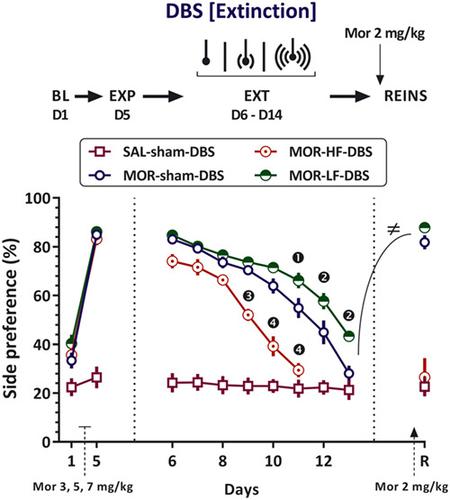当前位置:
X-MOL 学术
›
Addict. Biol.
›
论文详情
Our official English website, www.x-mol.net, welcomes your
feedback! (Note: you will need to create a separate account there.)
Deep brain stimulation of the orbitofrontal cortex prevents the development and reinstatement of morphine place preference.
Addiction Biology ( IF 3.1 ) Pub Date : 2019-06-18 , DOI: 10.1111/adb.12780 Golnaz Fakhrieh-Asl 1, 2 , Seyed Shahabeddin Sadr 1, 2 , Seyed Morteza Karimian 2 , Esmail Riahi 2
Addiction Biology ( IF 3.1 ) Pub Date : 2019-06-18 , DOI: 10.1111/adb.12780 Golnaz Fakhrieh-Asl 1, 2 , Seyed Shahabeddin Sadr 1, 2 , Seyed Morteza Karimian 2 , Esmail Riahi 2
Affiliation

|
The orbitofrontal cortex (OFC) is involved in compulsive drug seeking and drug relapse. Its involvement in cue‐, context‐, and stress‐induced reinstatement of drug seeking has also been confirmed in animal models. Deep brain stimulation (DBS) was proposed to be an effective intervention for patients with treatment‐refractory addiction. Therefore, in the present study, we investigated the potential efficacy of DBS in the OFC for controlling addictive‐like behaviors in rats. Rats were bilaterally implanted with electrodes in the OFC and trained to the morphine conditioned place preference (CPP; 3, 5, and 7 mg/kg). High‐frequency (HF; 130 Hz) or low‐frequency (LF; 13 Hz) DBS‐like stimulation was applied during the conditioning (40 minutes, once daily, 3 days) or extinction (20 minutes, once daily, 6‐10 days) trials. Following the extinction, morphine preference was reinstated by a priming dose of morphine (2 mg/kg). When applied during the conditioning phase, HF‐DBS significantly decreased preference for the morphine‐associated context. HF‐DBS during the extinction phase of morphine CPP reduced the number of days to full extinction of morphine preference and prevented morphine priming–induced recurrence of morphine preference. LF‐DBS did not change any of these addictive behaviors. HF‐DBS had no significant effect on novel object recognition memory. In conclusion, HF‐DBS of the OFC prevented morphine preference, facilitated extinction of morphine preference, and blocked drug priming–induced reinstatement of morphine seeking. These findings may indicate a potential applicability of DBS in the treatment of relapse to drug use. Further studies will be necessary to assess the translatability of these findings to the clinic.
中文翻译:

大脑对眶额皮质的刺激会阻止吗啡位置偏爱的发展和恢复。
眶额皮质(OFC)参与强迫性药物寻找和药物复发。在动物模型中也证实了它参与提示,情境和应激诱导的寻药恢复。提出深部脑刺激(DBS)是治疗难治性成瘾患者的有效干预措施。因此,在本研究中,我们研究了DBS在OFC中控制大鼠成瘾性行为的潜在功效。大鼠在OFC中双边植入电极,并接受吗啡条件性位置偏爱训练(CPP; 3、5和7 mg / kg)。在调理(40分钟,每天一次,3天)或消光(20分钟,每天一次,6-10次)期间应用高频(HF; 130 Hz)或低频(LF; 13 Hz)DBS样刺激天)试用。灭绝之后 通过启动剂量的吗啡(2 mg / kg)恢复吗啡偏爱。在调理阶段使用时,HF-DBS显着降低了对吗啡相关背景的偏好。在吗啡CPP灭绝阶段,HF-DBS减少了吗啡偏爱完全消亡的天数,并防止了吗啡引发引发的吗啡偏爱的复发。LF‐DBS并没有改变这些成瘾行为。HF-DBS对新型物体识别记忆没有显着影响。总之,OFC的HF-DBS阻止了吗啡偏爱,促进了吗啡偏爱的灭绝,并阻止了药物引发引起的吗啡恢复。这些发现可能表明DBS在治疗药物滥用复发中的潜在适用性。
更新日期:2019-06-18
中文翻译:

大脑对眶额皮质的刺激会阻止吗啡位置偏爱的发展和恢复。
眶额皮质(OFC)参与强迫性药物寻找和药物复发。在动物模型中也证实了它参与提示,情境和应激诱导的寻药恢复。提出深部脑刺激(DBS)是治疗难治性成瘾患者的有效干预措施。因此,在本研究中,我们研究了DBS在OFC中控制大鼠成瘾性行为的潜在功效。大鼠在OFC中双边植入电极,并接受吗啡条件性位置偏爱训练(CPP; 3、5和7 mg / kg)。在调理(40分钟,每天一次,3天)或消光(20分钟,每天一次,6-10次)期间应用高频(HF; 130 Hz)或低频(LF; 13 Hz)DBS样刺激天)试用。灭绝之后 通过启动剂量的吗啡(2 mg / kg)恢复吗啡偏爱。在调理阶段使用时,HF-DBS显着降低了对吗啡相关背景的偏好。在吗啡CPP灭绝阶段,HF-DBS减少了吗啡偏爱完全消亡的天数,并防止了吗啡引发引发的吗啡偏爱的复发。LF‐DBS并没有改变这些成瘾行为。HF-DBS对新型物体识别记忆没有显着影响。总之,OFC的HF-DBS阻止了吗啡偏爱,促进了吗啡偏爱的灭绝,并阻止了药物引发引起的吗啡恢复。这些发现可能表明DBS在治疗药物滥用复发中的潜在适用性。






























 京公网安备 11010802027423号
京公网安备 11010802027423号